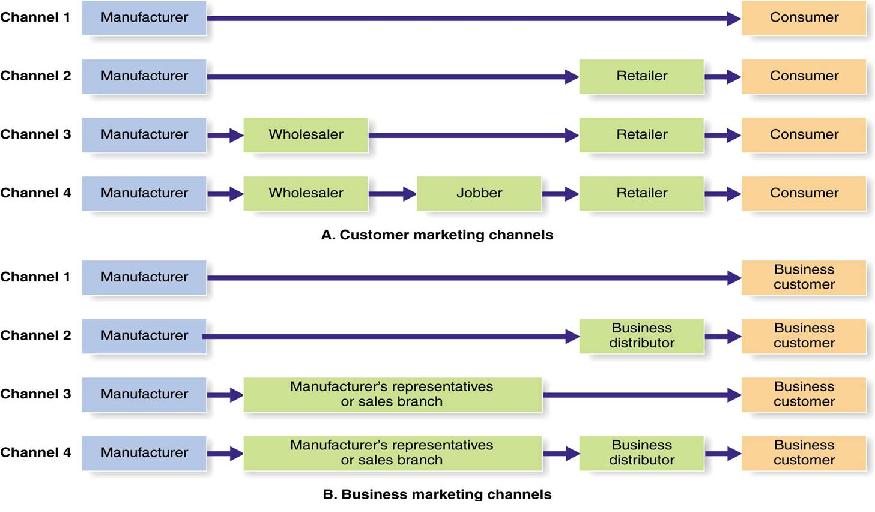On the basis of the discussion in the previous article Marketing Channel Conflicts, it can be easily understood that conflict is an inherent behavioral dimension in the marketing channel and various levels of conflicts may have both negative and positive effect on channel efficiency or possible no effect. A marketing channel conflict could affect the channel efficiency positively in the sense that when the members involved in the conflicts realize and identify the possible reasons for conflict and work towards removing these areas of disagreement. The conflicts might actually become functional. The need is therefore to sit back and understand the cause of conflict and to devise ways to overcome by working out a better solution. A central task inContinue reading
Marketing Functions
Marketing Channel Conflicts
Conflict is an inherent behavioral dimension in all social system including the marketing channel. In any social system, when a component perceives the behavior of the other component to be impending the attainment of its goal or the effective performance of its instrumental behavior pattern, an atmosphere of frustration prevails. When this frustration is not resolved by the other component, a stage of conflict may exist. More over if the other component also perceive it as the blockage in its attainment of goal then both the components become objects of each other frustration and the conflict arises. In distribution channel, the same is also applicable. Here the conflict may be sales man versus distributor, distributor versus wholesaler, wholesaler versus retailerContinue reading
Distribution Objectives
Interrelated objectives: A firm’s distribution objectives will ultimately be highly related–some will enhance each other while others will compete. For example, as we have discussed, more exclusive and higher service distribution will generally entail less intensity and lesser reach. Cost has to be traded off against speed of delivery and intensity (it is much more expensive to have a product available in convenience stores than in supermarkets, for example). Narrow vs. Wide reach: The extent to which a firm should seek narrow (exclusive) vs. wide (intense) distribution depends on a number of factors. One issue is the consumer’s likelihood of switching and willingness to search. For example, most consumers will switch soft drink brands rather than walking from a vendingContinue reading
Major Distribution Strategies in Marketing
Companies have to decide on the number of intermediaries to use in their channel. The various strategies that are available are as follows: Exclusive distribution Selective distribution Intensive distribution Exclusive distribution: It involves severely limiting the number of intermediaries handling the company goods or services. It is used when the producer wants to maintain a great deal of control over the source level and service output offered by the reseller. Often it involves exhaustive dealer agreement in which dealer agrees not to carry competitive brand. By generating exclusive distribution, the product hopes to obtain more aggressive and knowledge selling. Exclusive distribution tends to enhance the product image and attain larger markups. It requires greater partnership between the seller and theContinue reading
Marketing Strategy: Definition and Process
Marketing strategy consists of the analysis, strategy development, and implementation activities in: “Developing a vision about the market(s) of interest to the organization, selecting market target strategies, setting objectives, and developing, implementing, and managing the marketing program positioning strategies designed to meet the value requirements of the customers in each market target”. Strategic marketing is a market-driven process of strategy development, taking into account a constantly changing business environment and the need to deliver superior customer value. The focus of strategic marketing is on organizational performance rather than a primary concern about increasing sales. Marketing strategy seeks to deliver superior customer value by combining the customer-influencing strategies of the business into a coordinated set of market-driven actions. Strategic marketing linksContinue reading
Concept of Distribution Channels in Marketing
The Importance of Distribution Most producers use intermediaries to bring their products to market. They try to develop a distribution channel (marketing channel) to do this. A distribution channel is a set of interdependent organizations that help make a product available for use or consumption by the consumer or business user. Channel intermediaries are firms or individuals such as wholesalers, agents, brokers, or retailers who help move a product from the producer to the consumer or business user. A company’s channel decisions directly affect every other marketing decision. Place decisions, for example, affect pricing. Marketers that distribute products through mass merchandisers such as Wal-Mart will have different pricing objectives and strategies than will those that sell to specialty stores. DistributionContinue reading

